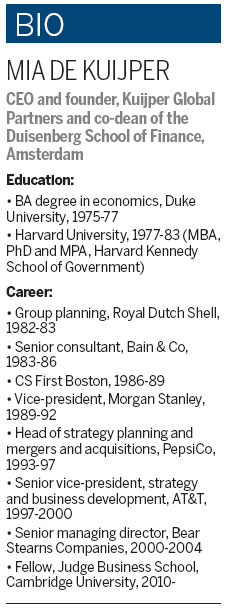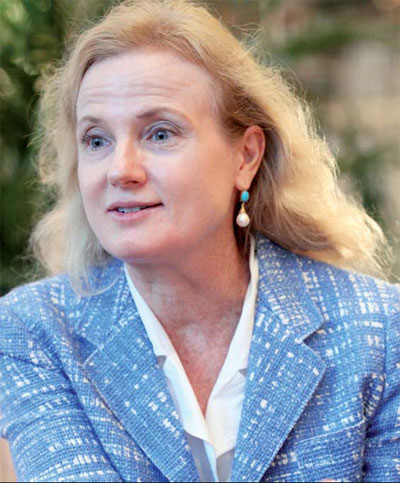Power of profit
Updated: 2011-09-23 09:13
By Andrew Moody (China Daily)
|
|
Western companies can learn from management practices of firms in emerging economies
Mia de Kuijper insists the West no longer has a monopoly on management know-how.
The Dutch-born business strategy consultant says companies in fast-growing emerging economies like China can now give major corporations in Europe and North America a lesson on how to do business.
"It is now a two-way street," she says. "Western companies can also learn from looking at the way companies in China, India and Brazil are doing things," she says. "There is a lot to learn from companies operating in these fast-growing markets. I have also been working with multinationals that are traditionally based in Europe and the United States who are coming to these markets and finding they need to adjust their business models."
The business guru, a former head of strategy planning for drinks giant PepsiCo and author of the internationally-acclaimed Profit Power Economics: A New Competitive Strategy for Building Sustainable Wealth, was in the lobby of the St Regis Hotel in Beijing on one of many visits to China over the last year.
De Kuijper, who divides her time between homes in New York and London and now has her own consultancy Kuijper Global Partners, has been advising a number of Chinese businesses on building their strategy.
"I have been working with one or two financial institutions, in particular, here," she says.
The former high-flying corporate executive, who is in demand throughout the world to speak at conferences on issues of business strategy, is planning a new book looking at how it is now possible to cherry pick best management ideas from the smorgasbord on offer from around the world.

"I am looking at what we can learn from successful companies around the world, both in developed economies and also in the new emerging markets," she says.
Her recent book Profit Power Economics, which was described by none other than Nobel Prize winner Thomas C. Schelling as "intellectually courageous", looked at how companies could seek out new areas to increase their profit.
She argues businesses have to be more innovative in seeking out new profit opportunities rather than just relying on producing a bottom line result from its main activity.
Another theme was that they have to protect their own positions from outside companies muscling in, citing mobile phone companies losing a major slice of business to Apple with its iPhone, even though the company was ostensibly in a different industry altogether.
"My argument is that businesses need to focus the part of the business where they have a sustainable competitive advantage. Business no longer is about trying to be everything to all people but really focusing on what you do well because you will get the highest return from that," she says.
She says what is a source of profitability is likely to change over time such as what has happened in the telecommunications industry.
"In the telecoms industry for a long time having a network infrastructure was a source of success and companies like AT&T were heavily invested in it. Then there was a major change," she adds.
De Kuijper first left her native Netherlands in the mid-1970s to read economics at Duke University in Durham, North Carolina. She then went to Harvard, completing an MBA, a PhD and then a Masters in Public Administration at the Kennedy School of Government. While she was still at Harvard she worked in the group planning department of Royal Dutch Shell, mixing the theoretical with the practical.
"The real world is crazier than the craziest academics can even think of. Having the theoretical background, however, helps you see the forests from the trees and to see the patterns that you can use to help companies get ahead," she says.
De Kuijper went on to be a management consultant for Bain & Co before moving into investment banking with Morgan Stanley and CS First Boston.
She landed the prime corporate position as head of strategy at PepsiCo in the mid-1990s, which gave her major experience of Asia, setting up bottling plants around the region.
"It was just as Pepsi was starting to get international. I think in the space of about two years we did about 50 deals," she says.
She moved on from there in a similar strategic role with AT&T and was at the vanguard of a number of women having senior roles.
She believes the position of women in the boardroom has regressed over the past decade, particularly in the West.
"I was the beneficiary of a lot of progress, a lot of opportunities to break through the glass ceiling. I am not sure, however, there has been a lot of progress in the last decade," she says. "If you look at the number of chief executives or woman leaders the speed of trajectory has slowed down somewhat."
She says there are more women evident in the boardrooms in China and also in India, a market she knows very well. "If you look at India there are a lot of women in leadership positions in corporate and other organizations," she says.
De Kuijper quit the corporate world seven years ago to focus on writing and setting up her own strategy consultancy.
"At this point I wanted to find a way to crystallize the lessons I had learnt and write it down. I came from an almost theoretical background but throughout my career I have had the opportunity to implement things," she says.
De Kuijper says that despite the current economic doom and gloom about market turmoil and the prospect of a double-dip recession she believes the corporate underbelly remains strong and resilient.
"I think the United States, in particular is coming out of quite a difficult time, and I think there is a discrepancy between the strength of industrial companies like Procter & Gamble and Apple who are doing really quite well and the economic headlines," she says.
"If you take a look around New York now there are a lot of aspiring young people working in venture capital and in high-tech companies that you didn't see before. I think it will take a while (economic recovery) to work itself out though."
De Kuijper says the important lesson that she has learnt is that in today's globalized world there is no one size fits all solution to any problem. "You might find that a company in Brazil has cracked one part of the code and others in India or China have cracked other parts. If you put it all together you might come up with the best demonstrated practices," she says.
(China Daily 09/23/2011 page24)
E-paper

Pearl paradise
Dreams of a 'crazy' man turned out to be a real pearler for city
Literary beacon
Venice of china
Up to the mark
Specials

Power of profit
Western companies can learn from management practices of firms in emerging economies

Test of character
Keyboard-dependent Chinese are returning to school because they have forgotten how to write

Foreign-friendly skies
About a year ago, 48-year-old Roy Weinberg gave up his job with US Airways, moved to Shanghai and became a captain for China's Spring Airlines.

